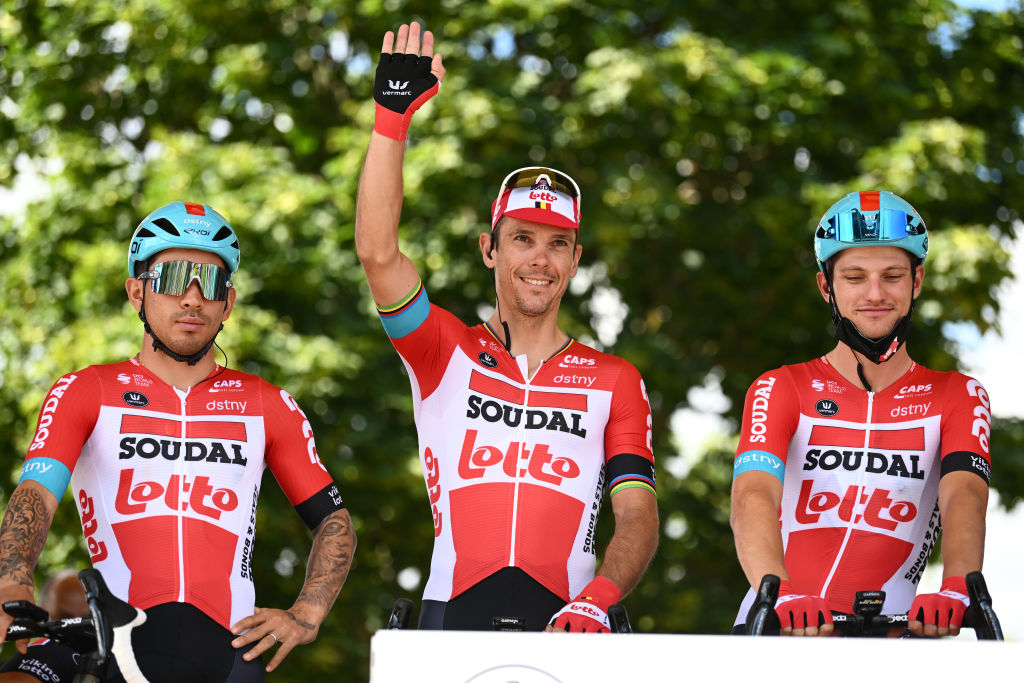Oldest Tour de France rider Gilbert celebrates 40th birthday with dose of realism
Belgian champ cautious about chances of final Tour de France stage win

Riding his 25th and last Grand Tour at the Tour de France, Belgian champion Philippe Gilbert (Lotto Soudal) is revisiting some of the scenes of his most memorable successes this week.
But for all the nostalgia that must spark, when it comes to his chances of one final triumph this July, Gilbert, who turned 40 on Tuesday, is determinedly keeping both feet on the ground.
Dunkerque was where the Belgian took his most recent win this May after a two-year drought on victories, and on Wednesday, too, Gilbert will be pounding many of the same sectors of pavé that he crossed en route to one of his greatest wins, in the 2019 Paris-Roubaix Classic.
Yet as the oldest rider in the Tour peloton this year told La Voix du Nord newspaper recently, in this year's race, while his chances of a stage win still exist, they are dwindling.
"I have thought about [coming to Dunkerque] during the Tour," he told the newspaper, "particularly as back in The 4 days of Dunkerque we went past a sign saying 'Tour de France - July 5th'. I didn't know the roads of today but I have some information and some good memories.
"Age doesn't help and my year has had several setbacks, but at Dunkerque I knew I could win again and that would give my teammates some kind of confidence.
"However, that's tougher on the Tour. Saying the same thing here to my teammates would be lying: I don't want to be ridiculous."
Get The Leadout Newsletter
The latest race content, interviews, features, reviews and expert buying guides, direct to your inbox!
Speaking later on French TV, Gilbert paid tribute to compatriot and stage 4 winner Wout van Aert (Jumbo-Visma), saying his fellow-Belgian "had been brilliantly positioned [on the climb where he attacked] and the tailwind helped him, but he did it very well."
He took a similarly sweeping perspective on the Tour's start in Denmark in La Voix du Nord, slating the two mass-start stages for being "monotonous" and "close to zero" on a sporting level although he instantly qualified that by adding that it would have changed with a crosswind.
Gilbert praised the massive support the Danish riders had received on their home soil. In that sense, he said, it was similar to the 2007 Tour de France start in London, which also had a prologue and a sprint stage before heading back across the Channel to more familiar territory.
"The peloton is very tired, because we were all so close together and that's stressful," he said.
"But in terms of the public, though, I'd give it [Denmark] 10 out of 10, you rarely see that [number of fans].
"There are also lots of great Danish riders, and it was really nice to see them getting so much encouragement. [Jonas] Vingegaard was getting cheers every 50 seconds."
He gave an equally-balanced opinion of the upcoming pavé stage, pointing out that from a point of view of a public spectacle, it was popular, but that it might have some major adverse effects on the GC battle.
"They are good up to a certain point. If [Tadej] Pogačar [UAE Team Emirates] falls on the pavés, even ASO will be sorry," he reasoned. "That can happen anywhere.
"Those who do Paris-Roubaix know how to race on the pavé. On the Tour, there are lots who haven't got the technique and who don't weigh much. So that can be debatable, but just up to now, it's provided a lot of spectacle and that's what they want."
As for his own chances of adding to that spectacle, Gilbert preferred to err on the side of caution.
"We are aiming to win with Caleb [Ewan], and it hasn't worked out yet. But I have to be realistic, it's going to be tough for me. So I try to use my experience and get in a break maybe. But physically, it's tough."
It's not just the challenges in that area, either. Gilbert recognised that the pressure on teams in the Tour, too, was much higher than in other races, and success was measured in different terms. As he told La Voix du Nord, "There are teams that are pleased with getting 6th in a bunch sprint. Is there any other race where they're happy with a top 10? That doesn't happen anywhere else."
Alasdair Fotheringham has been reporting on cycling since 1991. He has covered every Tour de France since 1992 bar one, as well as numerous other bike races of all shapes and sizes, ranging from the Olympic Games in 2008 to the now sadly defunct Subida a Urkiola hill climb in Spain. As well as working for Cyclingnews, he has also written for The Independent, The Guardian, ProCycling, The Express and Reuters.
